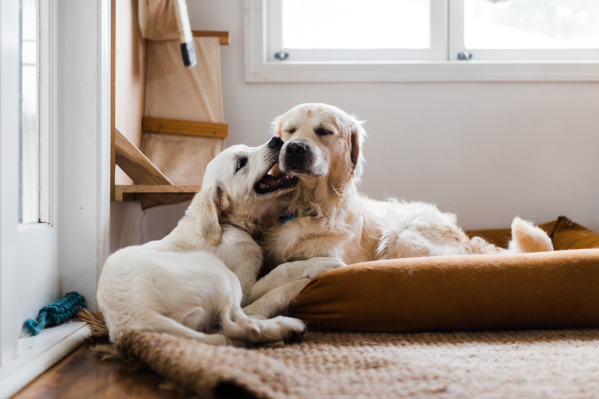Bringing home a new puppy is a wonderful, exciting time for a family. From puppy cuddles to playtime, there’s no shortage of joy that a fur baby can bring to your household.
But while you’re basking in that new puppy life, your older pets might not be so joyful…
The reality is that older pets are likely going to need some time to adjust. They may have some complicated feelings about your new addition—an addition that’s sharing your attention.
This abrupt change can certainly bring up a wide range of emotions and behavior from the older dog. But what exactly is your dog feeling? Is it depression? Or something else?
Read: How To Introduce A New Puppy To Your Dog
The signs of depression can be very similar to those of anxiety and other conditions, so it’s important to monitor your dog and consult with a vet for help.
5 signs your older dog is depressed about your new puppy
While symptoms vary depending on the dog, there are a few signs that your older dog may be feeling depressed about the new family member.
Lethargy
Changes in body language
Changes in sleep
Loss of appetite
Withdrawn behavior
Clingy behavior
Lethargy
If your older pup appears to be apathetic and generally has a lack of energy, this could signal depression.
Let’s say Fido used to love to play ball and now doesn’t even blink an eye or wag his tail when you try to engage. Jealousy and sadness about the new puppy could be the culprit.
Changes in body language
Maybe that tail-wagging, tongue-out look you’ve grown to love so much has faded. You might notice cowering, slouchy posture, tail between the legs, and ears back frequently if they're feeling down.
When you’re near both your dog and puppy, look out for these types of changes in body language to understand if it’s related to your new addition.
Changes in sleep
It’s important to look for any changes in your dog’s sleeping patterns. Some dogs will sleep a lot more if they’re feeling depressed, while others will have a more difficult time sleeping.
Loss of appetite
Sometimes when dogs are depressed, they will eat less. Keep your eyes peeled for any changes in appetite or digestive irritation in your older dog.
Withdrawn behavior
When some dogs are depressed, it goes beyond lethargy and they just want to be alone. You may find that your older pup no longer wants to be around family and prefers to hide or sleep a lot.
Clingy behavior
On the other end of the spectrum, you might notice that your older dog is extra clingy. They don’t want to leave your side and follow you everywhere. They simply don’t want to share your attention.
What to do if your older dog is depressed
If your older dog is showing signs of depression with your new puppy, there are a few things you can do to help:
Give your older dog extra attention
Create positive associations with the puppy
Give them space
Be patient
Accept that they might not be the best of friends
Talk to your vet
Give your older dog extra attention
Sometimes, all Fido is looking for is a little extra love.
Make a point to give your older dog extra attention when your new puppy comes home. Whether you sneak in some snuggle time in private or reward their good behavior with extra special treats, they just want to know that they’re still important.
Create positive associations with the puppy
When the puppy and the older dog are near each other, you can try to give your older dog some of their favorite things, like treats or toys. Only give these to them when they’re around the puppy, and they may start associating the puppy with positive rewards.
Read: Home With A New Puppy: What To Expect The First Year
Give them space
A puppy can bring a lot of energy to a new home—and sometimes that can be overstimulating, and even annoying, to an older dog who’s set in their ways.
Make sure your older dog has a place of their own to sleep away from the puppy. It’s also important to maintain as much of the older dog’s routine as possible. Let them have their favorite spot on the couch and don’t give their toys to the new puppy, or they may feel like they’re being replaced.
Be patient
Like many things in life, time is key. Your older dog might just need some time to adjust and establish a relationship with the puppy their way.
Try to avoid rushing the relationship or panicking if they don’t love each other immediately.
Accept that they might not be the best of friends
At the end of the day, not all dogs want to be friends. As long as they can cohabitate together and don’t cause one another any harm, you might just have to accept that they’re not going to be pals.
Talk to your vet
If your older dog is showing signs of depression after you bring home your puppy, it’s important to rule out other medical conditions that could be causing the change in behavior. Talk to a vet and they’ll be able to point you in the right direction given your dog’s medical history, breed, and behavior.
